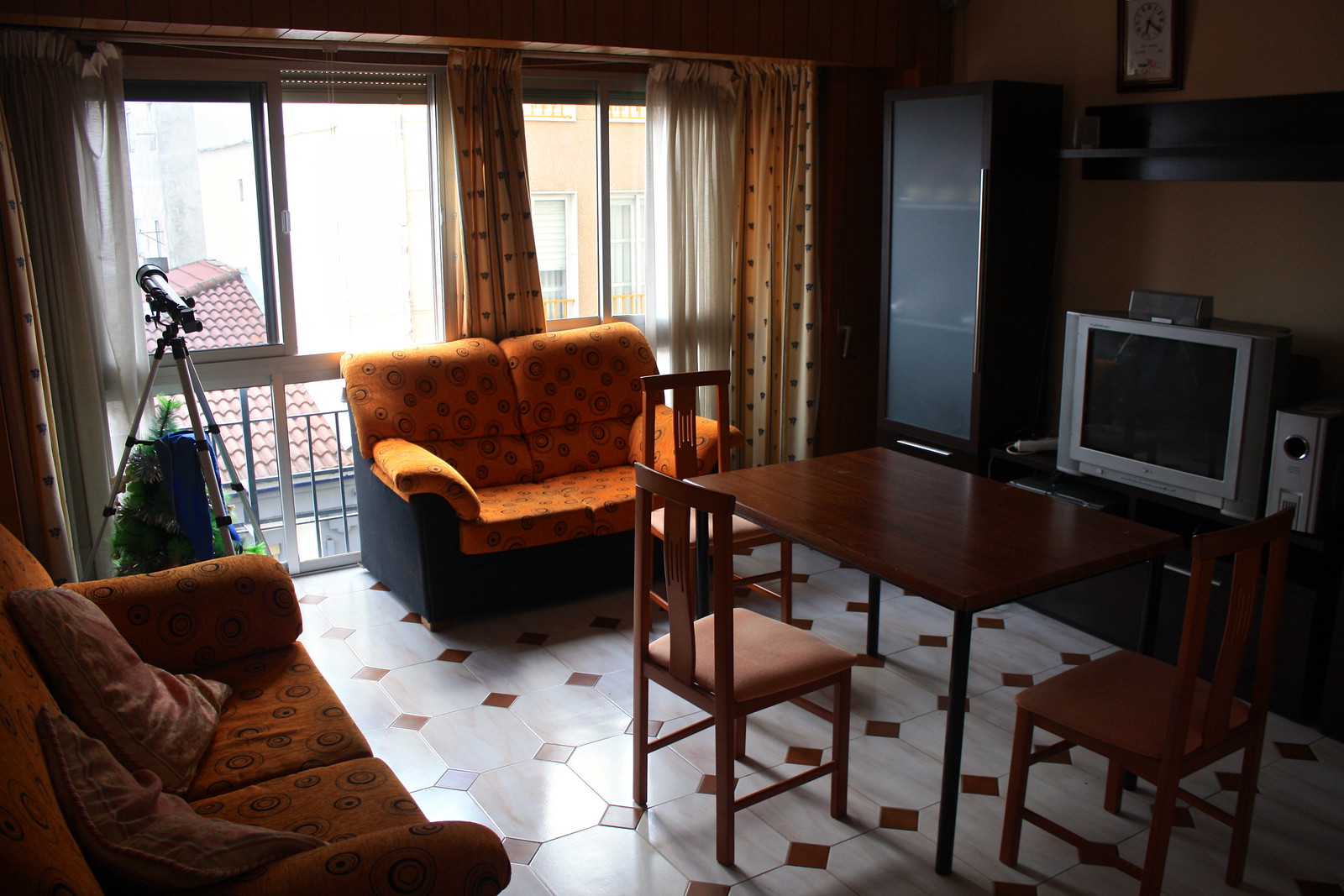From last October through May of this year, I worked as a
North American Language and Culture Assistant at a bilingual elementary school in southern Spain,
a job in which I assisted teachers in English, science, and music classes for 12 hours a week in return for 700€ a month and health insurance. I lived with two other Spanish guys in an apartment in the World Heritage-listed town of
Úbeda and was able to
travel all across the southern half of the country as well as to France and Morocco. Nine months of speaking Spanish and being immersed in Spanish culture—not to mention living on my own for the first time—turned out to be one of the best years of my life.
So, what are my thoughts about the program? If you guessed that they’re mostly positive, you’d be right—just take this post’s first paragraph (or read this blog!) as proof.
My personal experience as an auxiliar de conversación was a great one, and I was so fortunate to end up at a great school with a carpool that let me live in a bigger town with good public transportation connections.
However, everybody has a different experience in this program, often determined by your attitude but usually by where you get placed. Additionally, the total inconsistency in coordination and experiences means your year abroad has the potential to be amazing or
una mierda, as they say in Spanish.
Still, if you’re willing to take the risk that your year abroad may or may not turn out well, if you want to be in Spain
that badly, first read about my experience and the pros and cons of the program, and decide for yourself. I recommend participating, but I’ve got some reservations.
My experience
Teaching
I’ve heard a wide variety of stories when it comes to the actual work done to participate in the program; some people feel useless in all their classes and only work half the hours assigned to them, while others plan and teach all their lessons.
At my school, I fell fairly in the middle, as most days I simply showed up to most classes and followed the lead of the head teacher I worked with—be that dictating and/or translating textbook paragraphs or workbook instructions, to giving occasional culture presentations on customs, history, and holidays. Sometimes I would review vocabulary flashcards, other times I would teach the kids in music class an English song.
I went on one field trip with the sixth-graders to an
olive oil factory and was even invited to go on a ski trip to the Sierra Nevada. Most of the teachers at school were friendly, striking up conversations with me in English and Spanish and trying to include me in the handful of faculty dinners the school hosted (Christmas party, paella party, etc.). I never felt unwanted at school or a drag on resources simply because I was an American, and a group of four teachers who lived in and around Úbeda (where I ended up finding an apartment) allowed me to join in on their daily carpool to and from the village the school was in.
Living
At first I was really nervous about how my living situation would pan out, going back and forth between living in the World Heritage-listed town of Úbeda (population 36,000) and the school’s
pueblo,
Villanueva del Arzobispo (pop. 9,000); it really all depended on who I could carpool with and where I could find an apartment. Thankfully, four teachers in Úbeda graciously let me hitch a ride to school (even though I rarely was able to join in on their
football soccer conversations), and I came across a decent apartment to share with another Spanish guy for 120€/month not including utilities.
I really don’t think I could have had a better year given my school placement. I had originally requested to be placed in the grand city of
Córdoba (fat chance, Trevor…) and was, admittedly, disappointed to be stuck in what I thought was a backwater of the region.
But I soon found that
the province of Jaén held many treasures: mountains and national parks, dirt-cheap quality olive oil, and Renaissance architecture in every corner. I really fell in love with Úbeda: it was just a big enough town not to feel small, it had a wealth of gorgeous architecture a 15-minute walk from my apartment, it was well-served by bus to many destinations and a quick bus ride from one of the most important train stations in Spain, and there were half-a-dozen other language assistants in town to commiserate and hang out with. I made some really great friends that I’ll miss a lot next year!
Traveling
Like I said above, Úbeda has really great bus links across the province, region, and country, and is at the crossroads of the main Sevilla-Barcelona and Madrid-Granada train lines. I made travel one of my priorities this year (rather than shopping or going out every weekend) and was able to see a number of villages in Jaén, six of the eight provincial capitals in Andalucía, nine of the 17 regions in Spain, as well as parts of France and Morocco. I’m not trying to brag here, I’m just trying to make a point that I was really fortunate to be placed in a strategic location (and that I saved a lot of money to make it happen, too).
Not everyone who wants to travel gets so lucky, and not everyone who lives in a well-connected place cares about traveling. I’m super grateful of how things turned out for me, and at the same time I’m aware of how privileged I was to get to easily travel across southwestern Europe this year.
Now, that was
my personal experience in the language assistant program, but even my good English-speaking friends I hung out with in Úbeda had quite different times despite being in the same city. Take it with a grain of salt and keep in mind that your year could turn out completely different, for better or for worse.
Where the program shines
1) It allows you to live abroad
It’s not everyone’s cup of tea, but I know lots of people would kill to live in another country (i.e., Europe) for a spell and/or travel for an extended period of time. Not only does this program give you that opportunity, it also makes it super easy to travel across the continent (and northern Africa/western Asia) once you’re there, since you don’t have to keep paying for a transatlantic plane ticket and since Europe has really great public transportation.
Spending more than three months at a time in Europe is hard for Americans, but being a language assistant bypasses this problem and makes you legal for at least eight months! Living abroad looks great on a résumé, forces you to grow in many different ways, and lets you go to places you’ve always dreamed of visiting </cheesiness>.
2) It’s job with a living wage & health insurance
Let’s face it—for American twentysomethings fresh out of college, a job can be hard to come by, and even if you do find one, it might be one you’re over-qualified for, or hate, or don’t make enough to live off of. As a language assistant, you’ll be paid 700€ a month (1.000€/month in Madrid), which is more than enough to pay for a shared apartment, groceries, and other living expenses. All this—for 12 hours a week—and health insurance! It really is a great deal.
Obviously, you can make a lot more money under the table (
dinero negro) by teaching private English classes in your free time to pay for traveling or your plane ticket back home, but you don’t have to—which is nice.
3) It lets you practice Spanish
With people of Hispanic heritage quickly becoming the largest minority group in the United States, it’s more important than ever to be fluent in Spanish. However, even though a lot of people study the language in high school or college for their foreign language credit, they leave classes still unable to hold a basic conversation. I think this is mainly because there’s no real-world practice that goes on, which
can be difficult, but not impossible, in English-speaking America.
Here in Spain, you’ll
have to speak the language to survive, from getting an apartment, to buying groceries, to making friends—and what better way to practice than an “immersion” experience like the language assistant program?
4) It facilitates cultural exchange
Okay, I’m fully aware I’m gonna get all holding-hands-around-the-campfire-singing-kumbaya on y’all, but this year I’ve loved sharing a little bit about American culture to teachers and other Spaniards while at the same time learning how Spain works. From how loud you talk, to when you eat, to hand gestures, I’ve realized that just because something is different doesn’t mean it’s wrong or bad…it’s just
different, and that’s okay.
Taking yourself out of your home country allows you to see it with a fresh set of eyes—you come to term with its faults and appreciate what you love about it much more. More importantly, living abroad introduces you to a second home with all its history, languages, and especially food!
Where the program has to improve
1) Its application process is first-come, first-served
I’m not talking about the
actual act of applying for the program, as convoluted a mess it is. I’m talking about how the Spanish Ministry of Education selects candidates for the program. To make a long story short, as long as you have a bachelor’s degree and get a letter of recommendation sent in, once your application is completed (
admitida), the only criteria Spain looks at when they place everyone in May is your application number. Yes—this program is not merit-based in any way. In addition, no teaching experience or training of any kind is required, nor do you have to prove you can speak Spanish. Scary!
2) It has infamous payment issues
I would put this one first but the application process happens before you set foot in the country. This is simply the worst thing about the program; it’s been going on for years and I’d bet lots of €€€ it will continue next year as well. In a couple of regions—Murcia, Castilla y León, and even Andalucía to an extent—language assistants aren’t paid for their work done in the month of October until mid- to late-December…or January. That is, their first paycheck is
two to three months late. This is simply unacceptable, and yet it keeps happening and we keep hearing stories of
auxiliares struggling at the end of the year, their savings running out and their meals mainly pasta.
This is not okay, especially for a program put on by the government of a western nation that
entices attracts candidates with the offer of monthly financial support and then completely drops the ball for the first trimester. Not all regions have payment issues (like Galicia or the Basque Country), but those that do should either get their act together or drop the program outright, like Catalunya did.
3) Poor coordination leads to a wide range of experiences
Although the program is put on by the national Ministry of Education, since Spain is such a decentralized country, the regional education departments are in charge of the language assistants. This means that there are actually 17 different education systems running around a country smaller than the state of Texas (although it does have a larger population). This fragmentation leads to a wide range of experiences between, for example,
auxiliares in Andalucía and La Rioja, since there is no real How-To-Use-Your-Language-Assistant guide from Madrid. And even within the regions, things can vary wildly from province to town to school—be it whether the language assistant is actually used, to what kinds of classes they’re put in, to whether they paid on time.
4) Poor communication among governmental agencies
There’s little to no communication going on between the Spanish branches of government that deal with education and those that handle immigration. This means that, while the initial procedure for getting your papers isn’t too difficult,
renewing your residency is close to impossible because the process is configured for people who can stay in the country with a steady stream of income while they apply to renew their status. That is, it isn’t a problem for most foreigners because they just keep working at their jobs and living in their homes during the up to three months this process might take. But language assistants typically go home or travel during the summer and can’t afford to twiddle their thumbs in Spain with no jobs while they wait to get re-authorized.
Summary
Alright, there you have it—all my thoughts on the
auxiliares de conversación extranjeros en España teaching assistantship. You’ve gotten to read about how I personally fared at a bilingual elementary school in rural southern Spain and also what I think the pros and cons are of being a North American Language and Culture Assistant.
If you’ve been a language assistant before, what are your thoughts on the program? Join the discussion below!









